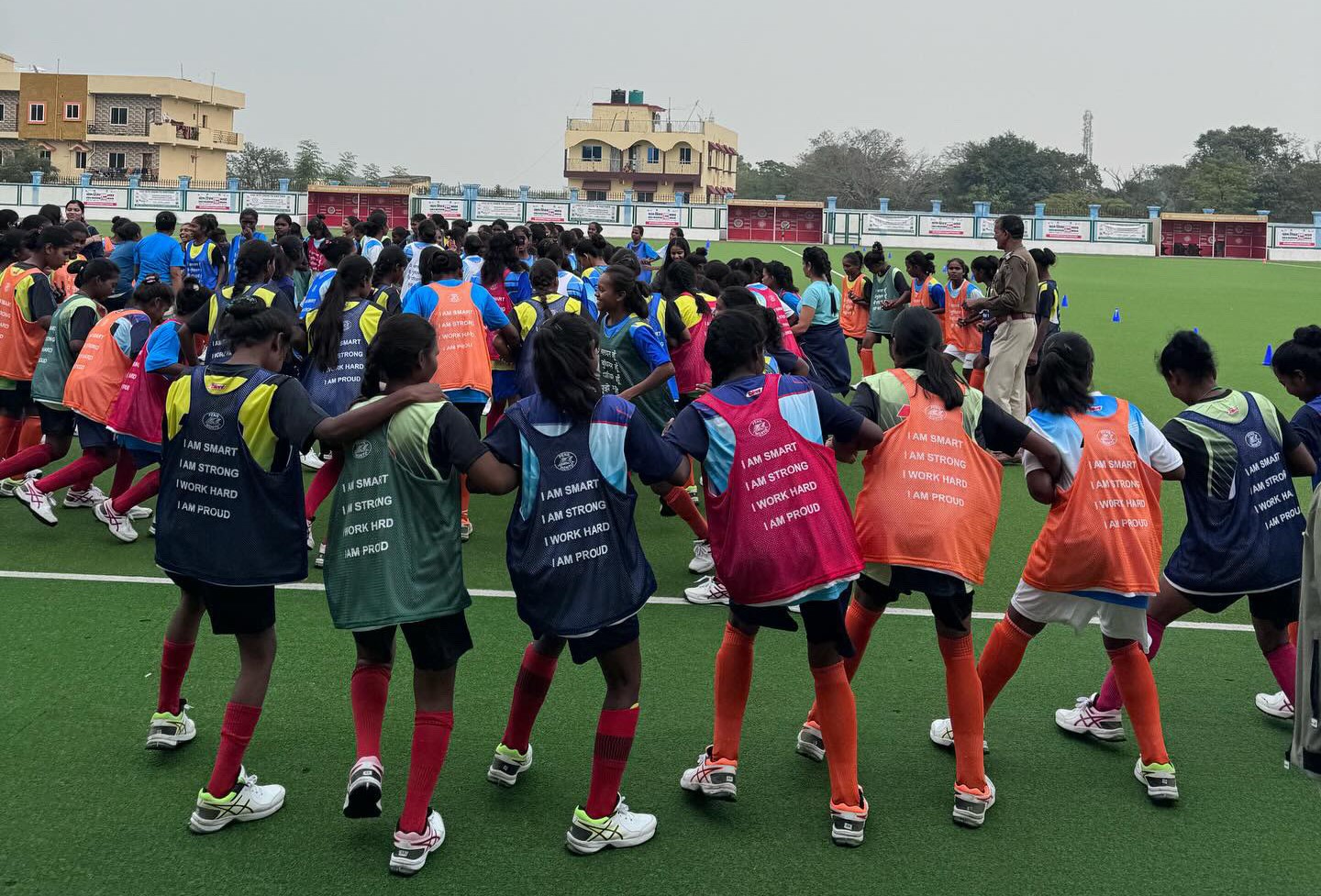Empowering Change: The Impact of the East India Hockey Project

By Laurie Temple, NFHCA
In a region marred by the threats of human trafficking, child marriage, and societal challenges, the East India Hockey Project emerges as a beacon of hope and empowerment. This anti-trafficking initiative, initiated by the US Consulate Kolkata in collaboration with Middlebury College, focuses on empowering young female leaders in Jharkhand, India, through a unique blend of field hockey and leadership training.
“The East India Hockey Project offers a week of hockey and leadership training, paired with education on key regional social issues faced by young women. The program provides each girl the time and space to grow, perform and share in a safe, exciting and joyful setting.” – Katharine DeLorenzo, Middlebury College head field hockey coach.
A Tapestry of Transformation
The project, born in August 2018, weaves a unique tapestry of hope and resilience for tribal girls in the Jharkhand region. This past November, 106 young women embarked on a transformative journey, immersing themselves in a week-long experience that seamlessly combined the rigor of field hockey with friendship and invaluable leadership training.
Designed to empower participants, the program went beyond the hockey pitch. Skills sessions not only honed their prowess in the sport but also fostered camaraderie and teamwork. Journaling became a powerful tool for self-reflection and expression, allowing the participants to articulate their dreams and aspirations.
Leadership in Action
“The development of each young woman between day one and day six was truly remarkable. The girls showcased their innate strength and charisma, laying the foundation for future leadership,” added DeLorenzo.
Recognizing the broader challenges faced by the region, the project addresses social issues, particularly human trafficking. The coaching staff, serving as goodwill ambassadors, facilitated education on key regional social issues faced by young women, fostering change and unity.
Throughout the clinic, the girls’ aspirations for the future became evident. Organizers witnessed positive changes and growth as the participants not only honed their hockey skills but also envisioned a different path for themselves. While the project faced unexpected challenges, such as the need for sensitivity to ensure equal opportunities, the staff adapted to ensure the success of the clinic. Key learnings included the importance of balance and equity in providing opportunities to all participants.
The cultural differences between the American coaching staff and the Jharkhand young women were navigated by providing translators for each American staff member, fostering mutual understanding through conversation and shared activities off the pitch.
Reflecting on the trip, organizers and staff perceived the universal desire for connection among people, transcending cultural and geographical differences. The power of connection, forged through shared experiences, dancing, smiling, hugging, playing, and sharing, emerged as a unifying force.
Looking ahead, the project envisions a long-term impact, not only for the participants but also for the broader community in Jharkhand. Plans are underway to establish a sustainable model with cost-sharing across various college and university programs beyond 2025 when the current funding concludes.
Challenges and Reflections
Anne Parmenter, retired Trinity College field hockey coach and former President of the National Field Hockey Coaches Association – and part of East India coaching staff this past November – expressed the challenges and reflections on the program. “The intensity of the week, filled with joy, laughter, and happy memories, raised questions about the lasting impact on the girls’ lives. The concerns about giving “false hope” were acknowledged, highlighting the complexity of the challenges faced by these young girls.”
The East India Hockey Project stands not just as a sports initiative but as a transformative force addressing deep-rooted societal issues. It empowers young women to envision a brighter future, fostering leadership, resilience, and hope in the face of adversity. As the program continues to evolve, it promises to be a catalyst for lasting change in Jharkhand, creating a ripple effect that extends beyond the hockey pitch.
About East India Hockey Project
The East India Hockey Project, a joint initiative of Shakti Vahini, a Delhi based non-profit Organization and U.S Consulate, Kolkata, aspired to promote empowerment and foster youth leadership and development among the young girls and women of Jharkhand. The camp brought together over 100 young women from tribal areas of Jharkhand to participate in sports, cultivate self-confidence, and transform their life.
AstroTurf is the Official Sponsor of the 2026 NFHCA Annual Convention. With over 50 years of experience and millions and millions of square feet of synthetic turf in use worldwide, AstroTurf products bring more technological expertise and real-world know-how to the game than any other brand.
